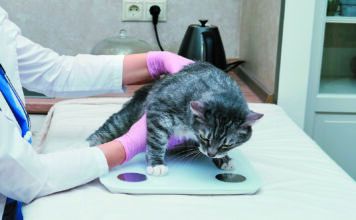Newly-identified viruses
Researchers at Colorado State University have recently discovered a group of cancer-causing viruses in several populations of mountain lions, bobcats and domestic cats - raising questions about whether the previously undetected viruses could be transmitted between the cat species, and whether they could be the root cause of some cancers found in our domestic cats. …
Giving Your Cat Insulin Injections
Diabetes ranks as one of the most common health conditions in cats, especially those who are overweight. As treatment, many cats will require daily insulin injections and adjustments to their meal program. If this becomes necessary, your veterinarian or a veterinary technician will demonstrate the technique in the office before you start doing it at home.
Some illustrated tips on how to give your cat an injection:
[IMGCAP(3)] [IMGCAP(4)] [IMGCAP(1)] [IMGCAP(2)]…
Kitten Nurseries Save Lives
When Executive Director Marc Peralta strolls through the No-Kill Los Angeles adoption center and sees all the cute kittens, he remembers when they were just one or two days old, so tiny that they fit in the palm of a hand. The kittens are graduates of NKLAs kitten nursery, the beneficiaries of a life-saving trend in progressive shelters: nurturing the most vulnerable and unadoptable animals until they are ready for homes. …
Feline Cognitive Dysfunction
Cats become increasingly susceptible to age-related disease conditions as they grow old, and most of these disorders are bound to have an effect on their behavior. Arthritis, for example, is likely to cause a formerly rambunctious cat to slow down dramatically as he transitions through his so-called golden years; kidney and urinary tract disease may severely impact the animals litter box behavior; periodontal disease and tooth loss may alter his eating habits; and progressive hearing…
New Research on Feline Vision
Experts now believe that cats can see into the ultraviolet spectrum, which means that they can see some things that we cant. Scientists discovered a long time ago that birds, fish and insects can perceive a wider range of light and color than human beings; but the new research extends the list to cats, dogs and certain other mammals, according to a study published in the Proceedings of the Royal Society B. …
All About Feline Seizures
In a normal cat, the transmission of these signals is governed by the central nervous system, which determines whether the neurons fire or are inhibited from doing so according to her various needs and desires. Unfortunately, this complex process goes awry in an estimated one percent or so of the general feline population. And when this occurs, a cat may experience a disturbing phenomenon broadly referred to as a seizure.
Mast Cell Tumors in Cats
Mast cell tumors are growths that commonly affect the skin of dogs, and, less commonly, cats. They are potentially serious, since some mast cell tumors are malignant. Luckily, they are often determined to be benign.
An Increase in FIV
The number of cats infected with the feline immunodeficiency virus (FIV) has increased by 48 percent since 2009.
Ebola and Cats
First discovered in Central Africa in 1976, the Ebola virus causes its victim to develop a fever and bleed internally and externally. Once the disease progresses, the virus has a 50 to 90 percent fatality rate in humans - and for now, there is no cure. Scientists attribute the introduction of the Ebola virus to fruit bats, and a growing concern is how the virus affects animals. The virus has also been detected in monkeys, chimpanzees,…
When to Consider Euthanasia
Knowing when its time to euthanize a beloved cat is obviously never easy, not even when your cat has reached a venerable age. When shes young or middle-aged but suffering from a serious illness or traumatic injury, it becomes even more difficult.
Feline Intestinal Disorders
Among all feline health problems, disorders that affect the intestinal tract rank among those that are most frequently diagnosed and treated by veterinarians. According to Linda Ross, DVM, an associate professor of small animal medicine at the Cummings school, The most common presenting complaints of such conditions are vomiting and diarrhea. At our clinic, we treat cats with these problems on a weekly basis. At a primary care facility, I would guess that veterinarians see multiple animals per week with one intestinal disorder or another.













